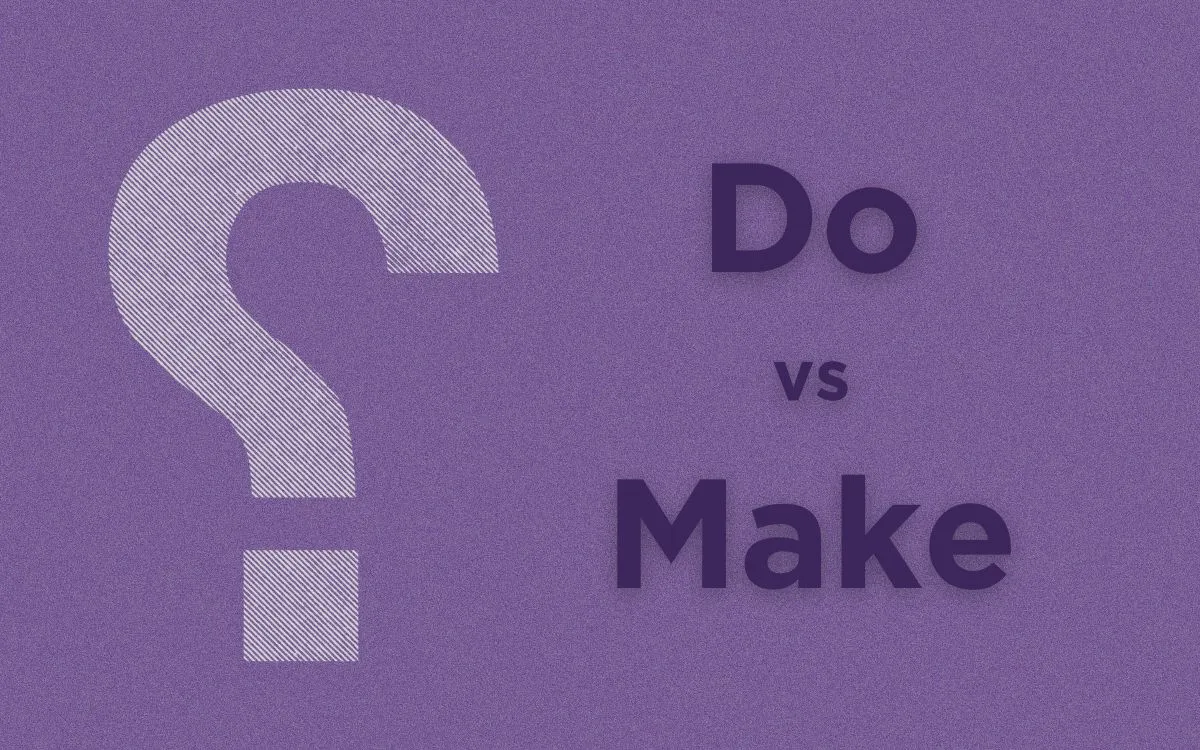
What is the difference between 'do' and 'make'? 'Do, make' usage examples.
Do and make are two verbs with similar meanings. Since they are versatile verbs, they can be used in different ways.
make
Produce
It is used when talking about something that is produced, prepared, or created.
| table | dress | car | engine | paper |
| dinner | cake | salad | coffee | pasta |
| art | movie | video | poem | music |
| list | law | rule | copy | note |
・I will make a cake for the party.
・The factory will make cars next month.
・She can make a dress in just a few hours.
・The government intends to make laws against pollution.
・They plan to make a documentary about climate change.
Cause
It is used in the sense of causing something to happen or emerge. It generally refers to a specific result of an activity.
| mistake | noise | hole | mess | mark |
| problem | trouble | issue | impression | disturbunce |
・Sometimes, even experts make mistakes.
・The children love to make noise when they play.
・His speech made a strong impression on the audience.
・I didn't mean to make trouble; it was a misunderstanding.
Mind
It is used when talking about the things we do using our mind or language.
| decision | offer | estimate | guess | choice |
| sugesstion | comment | speech | announcement | excuse |
| promise | wish | request | claim | threat |
| assesment | point | comparison | relationship | distinction |
・We need to make a decision soon.
・He made a suggestion to improve the project.
・I often make a wish when I see a shooting star.
・We need to make an assessment of the potential risks.
・I need to make an estimate of how long the project will take.
・It's essential to make a clear distinction between right and wrong.
Others
| love | war | peace | friend | agreement |
| money | profit | living | payment | investment |
| progess | improvement | changes | amends | discovery |
| effort | start | face | move | gesture |
| time | room | appointment | presentantion | call |
| exception | bed | toast | fire | habit |
・Investing wisely is a good way to make money.
・Every morning, I make my bed before starting my day.
・It's not always easy to make friends in a new city.
・Despite the workload, she tries to make time for her hobbies.
・The manager decided to make an exception and extend the deadline for the project.
do
General Action
It is used to indicate something that has been done in a general sense.
| something | anything | nothing | favour | one's best |
| good | wrong | harm | the good thing | the bad thing |
・Can you do me a favour?
・He always strives to do the good thing.
・Smoking can do harm to your health.
・I'll do something special for our anniversary.
・She felt guilty after realizing she had done wrong.
Specific Action
It is used to indicate a specific action, job, task or activity.
| work | housework | duty | job | task |
| the dishes | the cleaning | the shopping | yoga | exercise |
・I like to do yoga in the morning.
・She always does her duty diligently.
・Can you help me do the dishes tonight?
Study
It is used when talking about schoolwork, academic work, or a course.
| research | experiment | interview | survey | test |
| homework | report | course | biology | math |
・I need to do my homework.
・I did a biology course last year.
・She's doing research on renewable energy sources.
Others
| business | renovation | makeup | hair | puzzle |
・I like to do a puzzle every Sunday to relax.
・He's eager to do business with the new client.
・She did her makeup quickly before leaving the house.


